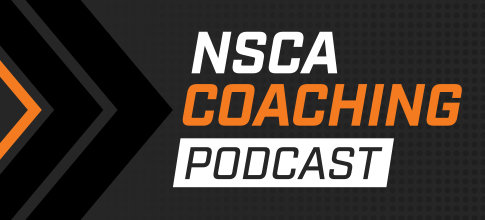NSCA’s Coaching Podcast, Episode 27: Martin Rooney
by Scott Caulfield and Martin Rooney
Coaching Podcast
April 2018
Martin Rooney, Head Coach of Training for Warriors, talks to the NSCA Head Strength and Conditioning Coach, Scott Caulfield, about defining a coach, balancing the coaching lifestyle, and myths and misconceptions about opening a gym.
Martin Rooney, MHS, PT, CSCS, is an internationally recognized coach and author. Rooney has a Master of Health Science degree and a Bachelor of Physical Therapy degree from the Medical University of South Carolina. He also holds a Bachelor of Arts degree in Exercise Science from Furman University. A former United States Olympic bobsledder, he is the creator of the Training for Warriors (TFW) system. TFW is used in over 260 locations in 25 countries and his training programs have been used by over one million athletes and adults worldwide. Rooney has trained athletes from the National Football League (NFL), Major League Baseball (MLB), Ultimate Fighting Championship (UFC), National Basketball Association (NBA), Women’s National Basketball Association (WNBA), as well as consulted several professional sport teams and military organizations.
Find Martin on Twitter: @martinrooney1 | Find Scott on Twitter: @scottcaulfield
Show Notes
“There’s one part about coaching it, there’s another part about doing it too.” 1:20
“It’s not just the Xs and Os, it’s not just knowing exercise or science.” 3:10
“Everybody’s looking for a coach that can affect their life.” 3:15
“When my Olympic dream ended… that’s when I realized, “Hey it’s time to go to work.” 4:48
“Now, looking back twenty years, I wish I would have gone for it earlier, and really taken a shot.” 6:03
“That’s when I really found my true calling and got the opportunity to [do] all the things that you said—from the NFL teams, to the NFL draft picks, to the military, to going and consulting at major universities.” 6:52
“[I] took the risk—there were so many people who said this is crazy.” 8:30
“[I] became the first strength and conditioning guy for MMA [mixed marital arts] because it really didn’t exist.” 8:47
“Twenty years later… half of the people doing our system are women… which everybody said would never happen.” 9:17
“But who’s that coach for that house mom or weekend warrior that’s now out of sports but who wants to be something again, and that was the void I went after to fill.” 9:42
“It’s this incredible feeling every day to get emails from people around the world of how their lives have been affected by the coaches that I’m getting to coach in my network.” 10:01
“We proved this stuff worked—what’s interesting is I didn’t see in the beginning that hey, you didn’t have to be a fighter to do it.” 11:00
“Now I’ve found my sweet spot of the ability to probably make the biggest impact I could versus working with, say, a few hundred athletes.” 11:57
“You just go deeper and deeper down the rabbit hole of actual exercise, thinking that’s going to be the thing that makes you more valuable.” 13:40
“Never think that I’m going to discount a degree or what you know, but what I’ve found was… that’s only half of it.” 14:32
“If you’re going to call yourself a coach, then you’ve got to be constantly growing to be a great person.” 17:45
“I think coaching is the most important job in the world.” 18:30
“Whether you’re a teammate, coach, [or] business coach; whatever it is, you are a coach to somebody else.” 19:58
“I think the job of a coach is to energize somebody so they’re better than before they met you.” 23:22
“Do they genuinely want to see people get better and that’s what excites them?” 25:09
“One thing I would always recommend is, hey, you should get around people you consider great coaches.” 26:28
“Where I got good at coaching was putting my feet on [that] turf and coaching 1,000 sessions.” 26:41
“The way I got better was by making a lot of mistakes—but learning from them.” 26:58
“[Work-life balance is] about being present… when you are there be there.” 30:19
“The thing that breaks my heart is watching a lot of people leave our industry because they couldn’t make it.” 39:41
“Should you own a business? Because not everybody should.” 40:19
“If you are not fired up, you’re not getting anyone else fired up.” 42:22
“Coaching is not writing a workout on a wall, they come in and do it, and you just stand there and watch them.” 43:26
“Coaching is this non-stop of just being all over everybody and really showing an individual interest in getting somebody… a little bit better than before you met them.” 43:34
Reporting Errors: To report errors in a podcast episode requiring correction or clarification, email the editor at publications@nsca.com or write to NSCA, attn: Publications Dept., 1885 Bob Johnson Dr., Colorado Springs, CO 80906. Your letter should be clearly marked as a letter of complaint. Please (a) identify in writing the precise factual errors in the published podcast episode (every false, factual assertion allegedly contained therein), (b) explain with specificity what the true facts are, and (c) include your full name and contact information.
- Privacy Policy
- Your Privacy Choices
- Terms of Use
- Retraction and Correction Policy
- © 2026 National Strength and Conditioning Association
